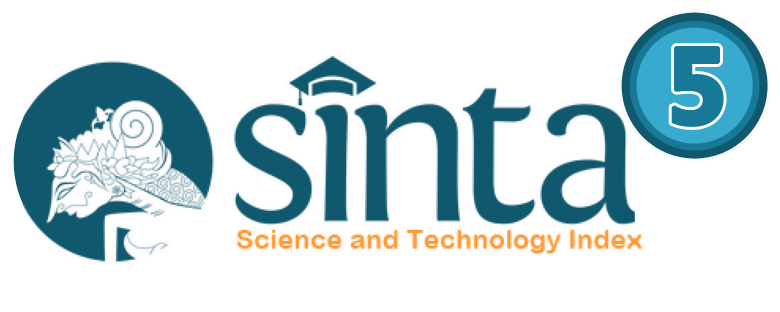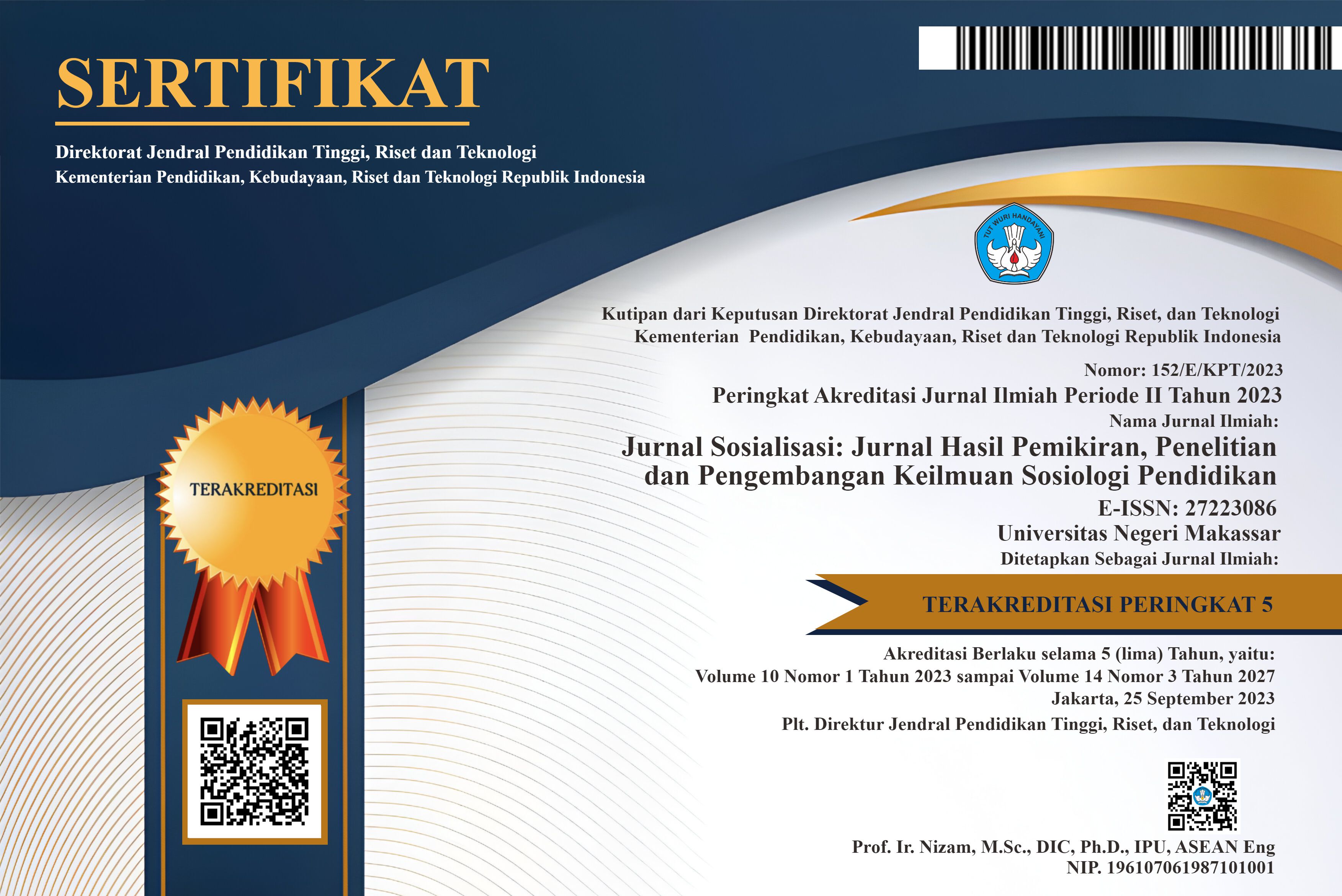The Food and Agricultural Organization of the United Nations’ (FAO) Intervention to the Covid-19 impacts on food security in Nigeria, 2019-2021
(1) University of Calabar
(2) University of Calabar
(3) Nigeria Police Force, Abuja
(4) University of Calabar
(*) Corresponding Author
DOI: https://doi.org/10.26858/sosialisasi.v1i2.34040
Abstract
Food insecurity has remained a problem in Nigeria despite its abundance in agricultural resources. However, the situation exacerbated with the outbreak of the COVID-19, as prices of foods increased and food shortages were experienced due to restrictions placed by the government to contain the virus. Thus, as persons battled to control the spread of the virus, they also battled with hunger, malnutrition and starvation. Covid-19 pandemic impacted food security by reducing purchasing power of individual and households due to job loss; reduced the availability and affordability of food due to the restrictions on movement, interstate travels and border closures; food transportation and distribution were also disrupted amongst other factors. Due to these negative impacts, interventions to manage the widespread food insecurity had to be launched by individuals, private companies, religious bodies, government and international organisations in order to alleviate the food crises induced by Covid-19. The thrust of this paper is to examine the Food and Agricultural Organisations’ intervention to the COVID-19 impacts on Food security in Nigeria. The paper proffers viable ways for more international engagement in order to solve the problem of food insecurity in Nigeria.
Keywords
Full Text:
PDFReferences
Agbachom, E. and Amalu, E (2016). Promoting implementation of sustainable developmentgoals in rural Nigeria: I Poverty issues and their determinants among cassava-based farming households in Akpabuyo Local Government Area, Cross River State, Global journal of Pure and Applied Sciences, 22, 7-19
Amalu, E. and Agbachom, E (2016). Promoting implementation of sustainable development goals in rural Nigeria: II Food security issues and their determinants among cassava-based farming households in Akpabuyo Local Government Area, Cross River State, Global journal of Pure and Applied Sciences, 22, 21-31.
Amalu , M..N. (2020a). COVID-19 Pandemic: Improving Mental Health and Psychological well being of students in Nigeria, in E.B Usoro, A.D Usoro & C. Emmanuel (Eds.). COVID-19: The Changing Landscape of higher education in Nigeria (pp.56-64). Uyo:Benchmark Educational Services. ISBN NO: 978-978-984.
Amalu, M.N. (2020b). Psychological Impact of COVID -19 pandemic on mental health of students in Nigeria: Professional Interventions. Prestige Journal of Education, 3 (1), 96-104 (https://openaccessglobal.com/prstige-ournal-of-education1.
Amalu, N.S. and Adetu, M.O (2018) Food Security and Nigeria’s Development since Independence: Opportunities and Constraints. International Journal of Public Administration and Management Research (IJPAMR). 4 (4) 69-81.
Amalu, N.S., Demson, E. & Jack-Rabin, Y. (2021). The Role of Diaspora in Peacebuilding: The Case of Nigeria. Social Sciences, Humanities and Education Journal (SHE Journal) 2 (3), 287-299.
Ariche, C. K., Ikegbu, E. A. and Amalu, N.S. (2021). Covid-19 palliative of cases of mismanagement: Altruism and egoism, The Nigerian experience. Pinisi Journal of Art, Humanity and Social Studies, 1 (1), 54-63
Armed Conflict Location and Event Data Project ( ACLED, 2020). COVID-19 disorder tracker. Retrieved from https://acleddata.com/analysis/covid-19-disorder-tracker/ on 6 April, 2022.
FAO (2014). The State of Food Insecurity in the World- Strengthening the Enabling Environment for Food Security and Nutrition. FAO.
FAO.“Your guide to Fao”.Year Book Series 2018.
FAO (2020). Nigeria: Revised Humanitarian Response May-December Corona-virus Disease 2019. Rome. 2020.
FAO (2020a). Coronavirus disease 2019(COVID-19), Addressing the impacts of COVID-19 in Food Crises. FAO’s component Global COVID-19 Humanitarian Response Plan. (April-December 2020)-May Update. Rome. https://www.fao.org/3/ca9192en/CA9192EN.pdf.
FAO (2021) North Eastern Nigeria: Adamawa, Borno, Yobe States, Response Overview.
FAO (2021). National Agrifood Systems and COVID-19 in Nigeria. Effects, policy and long-term implications. Food and Agriculture Organization of the United Nations, Rome. https://doi.org/10.4060/cb3631en
FAO (2021g). Real-Time evaluation of FAO’s COVID-19 Response and Recovery Programme, Annex 3. Humanitarian Response. Food and Agriculture Organization of the United Nations, Rome.
Gowan, R. (2020). Covid-19 and Conflict. UNA-UK. https://www.sustainablegoals.org.uk/covid19-and-conflict/
Ikegbu, E. A., Iwuchukwu,G.C.S.,Aloysius,E.S.,&Ariche,C.K(2020).Poverty of leadership. Corona virus and sustainable development in Nigeria. European Journal of Sustainable
Development, 9(4), 351-363, Doi: 10.14207/ejsd.2020.v9n4p.
International Labour Organisation (2020). World employment and social outlook Trends 2020,
Geneva. Retrieved from https://www.ilo.org/wcmsp5/groups/public/---dgreports/---dcomm/---publ/documents/publication/wcms_734455.pdf on 8 April, 2022.
Lashitew, A. & Kanos, D. (2020). Figures of the week: the effects of COVID-19 on food and
income security. Africa in Focus, Thursday, July 9, 2020. Retrieved from https://www.brookings.edu/blog/africa-in-focus/2020/07/09/figures-of-the-week-the- effect-of-covid-19-on-food-and-income-security-in-africa/ on 7 April, 2022.
Pais, G.; Jayram, K.& Van Wamelen, A. (2020). Safeguarding Africa’s food system through and beyond the crises. Understanding the impact of covid-19 on African agriculture—and how governments and private- sector actors can respond. McKinsey & Company.
Retrieved from https://www.mckinsey.com/~/media/McKinsey/Featured%20Insights/Middle%20East%20and%20Africa/Safeguarding%20Africas%20food%20systems%20through%20and%20beyond%20the%20crisis/Safeguarding-Africas-food-systems-through-and-beyond-the-crisis-vF.pdf on 8 April, 2022.
Ogunji, Stanley Iheanacho, Chinwe Victoria Ogunji , Michael Olaolu,
Vivian Oleforuh-Okoleh , Nuria Amaechi, Esther David, Onyekachi Ndukauba, Theophilus Maduabuchukwu Ikegwu, Cresantus Biamba, and Delight Chinonyerem (2021). Counting the Cost: The Effect of COVID-19 Lockdown on Households in South East Nigeria. Sustainability, 13, 12417. https://doi.org/10.3390/su132212417 https://www.mdpi.com/journal/sustainability
Torero, M. (2020). Prepare food systems for a long-haul against COVID-19, in COVID-19 and global food security, (Eds.) J. Swinnen and J. McDermott. Part Seven: preparing food systems for future pandemics, Chapter 27. Pp.118-121. Washington: International Food Policy Research Institute (IFPRI), .https://doi.org/10.2499/p15738coll2.133762_27.
Ugbodaga, M.(2021). COVID-19: Nigeria’s annual diaspora remittances reduced by 20%, says
FG. Retrieved from www.thecable.ng/covid-19-nigerias-annual-diaspora-remittances- reduced-by-20-says-fg/amp on 7 April, 2022.
Uzuegbu, L. (2022). ChartoftheDay: 21.4% of Nigerians faced Severe Food Insecurity between 2018-2020. Retrieved from https://www.dataphyte.com/latest- reports/development/chartoftheday-21-4-of-nigerians-faced-severe-food-insecurity-between-2018-2020/ on 8 April, 2022.
World Bank (2020). World Bank Predicts Sharpest Decline of Remittances in Recent History, PRESS RELEASE April 22, 2020. Retrieved from https://www.worldbank.org/en/news/press-release/2020/04/22/world-bank-predicts-sharpest-decline-of-remittances-in-recent-history on 7 April, 2022.
World Health Organisation (2020).WHO Director-General's opening remarks at the media briefing on COVID-19. Retrieved from https://www.who.int/director-general/speeches/detail/who-director-general-s-opening-remarks-at-the-media-briefing-on-covid-19---11-march-2020 on 7th April, 2022.
Article Metrics
Abstract view : 302 times | PDF view : 52 timesRefbacks
- There are currently no refbacks.

This work is licensed under a Creative Commons Attribution 4.0 International License.


































